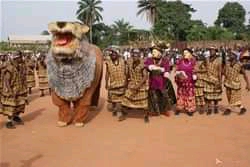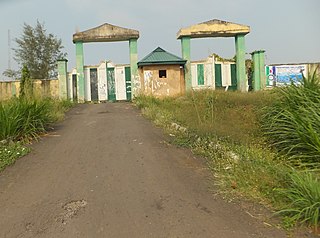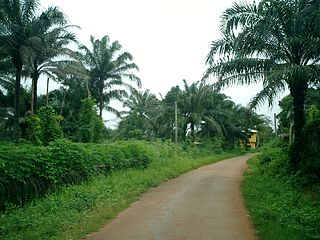Eziowelle is a town in Idemili North local government area of Anambra State, Nigeria. Eziowelle translates into English as 'a good place'. It is an agrarian community lying about twenty-three kilometers east of Onitsha. The Vatican Cardinal Francis Arinze is a native of Ezoiwelle. Eziowelle is in Idemili North Local Government Area.Historically, Eziowelle, Nimo Owelle, Abagana and Abba; all in Njikoka local government except for Eziowelle are siblings. Eziowelle is the first son of Owelle and is followed by Nimo, then Abagana and Abba being the last child. Their father was Owelle hence Eziowelle and Nimo Owelle bore their father's name while others still do but it's more pronounced in EziOwelle and Nimo Owelle than others. It has boundaries with Abatete, Abacha, Nimo Owelle, Abagana, Ogidi, and Umunachi. Eziowelle is made up of five villages which are Umuikwele, Umunnama, Ezinimo, Okpaliko, and Ubulu. According to Peter Emelumgini, in his book, A Compendium Knowledge of Eziowelle, "the first people to settle in Eziowelle were the Uruojukwu and Uruogbuefi of Umuikwelle ... before Umuikwelle Etiti migrated from Ifite-Ikwele and settled, with the originals. In Umunnama, the Uruezenebo were the originals, or settled earlier before others came from Umunoha of Port Harcourt side. In Ezinimo village, the Umu-oba, Umuoradigwo, Umu-Chidobelu-Ezeokobu, Umuagu, Uruama, Umudimatuand Umuawa settled earlierthan others before others came from Isi-Uzo Nsukka side when they were driven and scattered as a result of tribal wars. Some others later joined the village from other locations when they were driven out of the town as a result of misunderstanding and constant quarrelling from their relatives and that made them move and settle with the early settlers." The last two villages which are Okpaliko and Ubulu are believed to have migrated from Nteje, a town in the Anambra State of Nigeria between the 18th and 19th centuries. The town is ruled by a traditional ruler called "Igwe" as obtainable in other neighboring Igbo-speaking towns. The Igwe of Eziowelle is also called the Owelle of Eziowelle after Owelle the great ancestor of Eziowelle. The current Owelle of Eziowelle is Igwe Mike Okonkwo Etusi..The first OWelle of Eziowelle, Igwe Christian C. Anene relinquished the throne to the Owelle 2, after his death in 1990. The current Onowu of Eziowelle is Obi J. Akukwe.
Atani is a city on the eastern bank of the Niger River in Anambra State, Nigeria. Atani is the headquarter of Ogbaru Local Government Area, a Local Government in the Northern Senatorial District of Anambra State. It is one of the communities in Ogbaru situated in Igboland. Her political relations differ not so much from what obtains in other communities in the Igbo enclave. Disparities however exist in terms of geographical location and tradition. The political structure in Igboland begins from the family- Umunna as the smallest unit, and extends to community – Obodo, which is the largest unit. It was a town populated by early fishermen and migrant settlers. Atani is still the rice, fish, yam and cassava basin of Anambra state, producing most of the food sold in many markets in Delta and Anambra States. Atani people are Ukwuani.

Nnewi is a commercial and industrial city in Anambra State, southeastern Nigeria. It is the second largest city in Anambra state after Onitsha. Nnewi as a metropolitan area has two local government area, which are Nnewi North and Nnewi South, all centred around the Nnewi town. Even Ekwusigo local government area is now part of Nnewi urban area, as urbanization continues to spread from Nnewi to neighbouring communities. The Nnewi town which is the only town in Nnewi North, comprises four villages: Otolo, Uruagu, Umudim, and Nnewichi. Nnewi had been the centre of economics and commerce, being at a time the fastest growing industrial city east of the Niger, being the home of many industries such as The Ibeto Group, the Chicason Group, Cutix Cables, amongst others. The first indigenous car manufacturing plant in Nigeria is located in the city while the first wholly Made-in-Nigeria motorcycle, the 'NASENI M1' was manufactured in Nnewi.
Ogidi is an Igbo speaking town and the headquarters of Idemili North Local Government area, Anambra State, Nigeria. It has an estimated population of 70,000 people and share boundaries with neighbouring towns like Abatete, Eziowelle, Ṅkpọr, Ụmụnnachị, Ụmụoji, Ogbụnike and Ụmụdiọka.
Alor is one of the seven communities comprising the Idemili South Local Government of Anambra State in the southeast geopolitical zone of Nigeria. It is surrounded by seven neighbouring towns, namely Oraukwu, Nnobi, Abatete, Ideani, Uke, Adazi Ani and Nnokwa. Alor has several rivers which names in most cases are derived from the major idol of the village touched by the river – Mmili Ezigbo, Mmili Nwangene, Mmili Ọhọsha, Mmili Ideọhwọlọ, Mmili Iyiogwgwu, and Mmili Ọbịaja.

Idemili North is a Local Government Area in Anambra State, South-Central Nigeria. Towns that make up the local government are: Abacha, Abatete, Eziowelle, Ideani, Nkpor, Obosi, Ogidi, Oraukwu, Uke, Umuoji. Its headquarters is located in Ogidi.It is part of the Greater Onitsha Metropolis.

Oyi is a Local Government Area in Anambra State, Nigeria. It is home to the Oyi people. The towns that make up the local government are Nkwelle-Ezunaka, Awkuzu, Ogbunike, Umunede Umunya and Nteje.
The Umuoji people are those whose roots can be traced to the town of Umuoji in Idemili North, a local government area in Anambra State, Nigeria. These people are from Igbo-speaking ethnic group whose early history is adversely affected by a lack of, or non-existent, written records. Umuoji is bounded by Ogidi, Ojoto, Uke, Abatete and Nkpor and has an estimated population of 80,000 people which includes local residents in its 23 villages and citizens in diaspora.
Enugwu Aguleri is a community in Anambra state (Nigeria) with one of the oldest dynasty in South eastern Nigeria in which the kingdom has produced over thirty four kings of Aguleri, up to the 18th century, and has continued, in recent times, up to now, to produce the ruler of Enugwu Aguleri. The Ezeora dynasty has remained powerful been the sacred holder of the Ovo Eri and as well occupying the throne of Eri at Obu-Gad. It is located in the present Anambra State.

Awgbu is a town in Orumba South Local Government Area of Anambra State, South East of Nigeria. The town of Awgbu had an estimated population of 120,000 as at 2006. Awgbu town shares boundaries in the west with Agulu and Mbaukwu; in the east with Ndikelionwu, Omogho, and Awa; in the north with Umuawulu and Amaetiti; while in the south with Amaokpala and Nanka. The indigenes of Awgbu are the descendant of Ezekanunu. Ezekanunu has six sons from five wives: They include Ugwu, Abor, Osikwu, Ohzu and Amaugo, and Mbulukor. The practice then being that inheritance are shared according to wives. There are five villages in Awgbu.
Umunya is an Olu Town and one of the five communities that make up Oyi Local Government Area (LGA) of Anambra State Nigeria. It is bordered by six neighbors: Ifite-Dunu, Awkuzu, Nteje, Nkwelle-Ezunaka, Ogbunike, and Umudioka. In the south lies Umudioka and Ifite-Dunu, both in Dunukofia LGA. In the north, Nteje and Nkwelle-Ezunaka. In the east, Awkuzu and in the west, Ogbunike. The boundaries are naturally demarcated by streams except at the border with Nkwelle-Ezunaka where an expanse of Umunya heath namely, Oli-Omoto, Ogwugwu-Obo, Ugwueze, etc. crossed the Kpokili River. Nearly all ten villages of Umunya have their own fresh water springs. The town has fertile lands; hence, its economy is based on agriculture.

The Nze na Ozo society, otherwise known as the Agbalanze society, is the highest and most important spiritual, religious and social grouping in the Igbo society of Southeast Nigeria.

Anaku is one of the administrative divisions of Anambra State, South-Eastern Nigeria. The town lies 6°15' North of the Equator and 6°44' East of the Greenwich Meridian. It is bordered by "Omabala," the native name of the Anambra River, which is a tributary of the River Niger (North), Aguleri, Ezu River (South), Omor and Umuerum communities (East).

Awka-Etiti, historically known as Awka-Diedo ; later mentioned as Awka-Nkakwu (Okankaku) by colonial authors, is an affluent town comprising seven villages in Idemili South local government area of Anambra state, Nigeria. The seven villages of Awka-Etiti in order of age established are: Nkolofia, Umunocha, Ejighinandu, Iruowelle, Umudunu, Nnaba and Ogunzele.

The Ofala Festival is an annual ceremony practiced by Igbo people, particularly the indigenes of Onitsha, Umueri, Umuoji and other neighboring communities such as Aguleri, Nnewi and Ukpo in Dunukofia Local Government Area. It serves as a rites of renewal of the king or Igwe or Obi and it is similar to the Igue festival in Benin and the Ine, Osi or Ogbanigbe Festival in many mid-West Igbo communities of Nigeria. The term ofala, is derived from two Igbo words - ọfọ and ala. The festival is celebrated within two days mostly in October by the Obi and is a customary obligation that must be performed every couple of years without fail.
The Nnewi monarchy is a traditional inheritance of the throne based on patrilineality and sonship heredity. In Nnewi the traditional monarch is called the Igwe. The Igwe is born and not made or elected, and the institution of inheritance is the traditional right and primogeniture privilege. The position is neither transferable nor negotiable.
Neni, is an Igbo speaking town in Southeastern Nigeria.
Nawfia is a town in Njikoka Local Government Area of Anambra State, Nigeria. Nawfia is surrounded by neighbouring towns namely Enugwu Ukwu, Awka (Umuokpu), Nise, Amawbia and Enugwu Agidi. It is predominantly occupied by the Igbo ethnic group and is believed to be one of the towns that make up the ancestral home of Igbo people. Most of its inhabitants are Christians. Igbo and English are the predominant languages spoken in Nawfia.
Nimo Owelle, also known as Nimo, is a large town in southeastern Nigeria. As of 2021, the traditional ruler of Nimo is Igwe Max Ike Oliobi.








